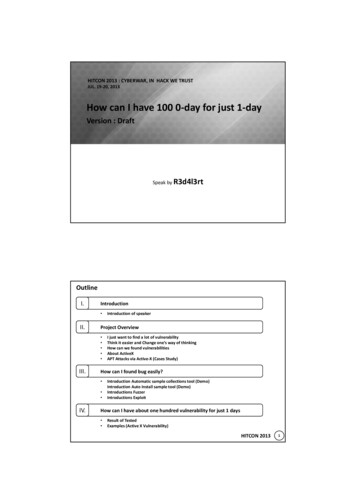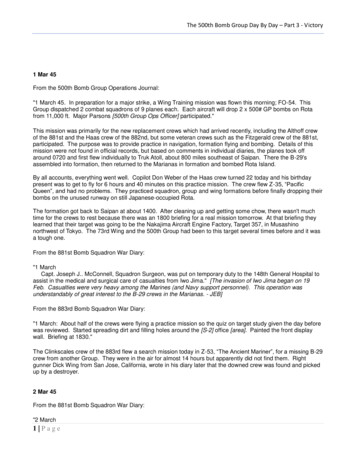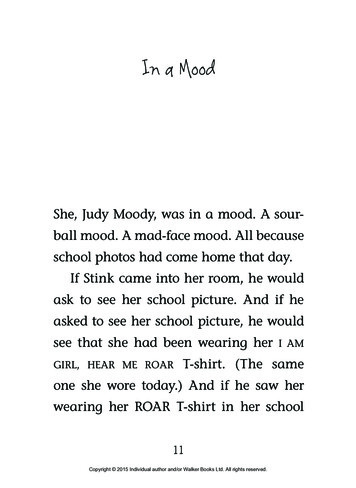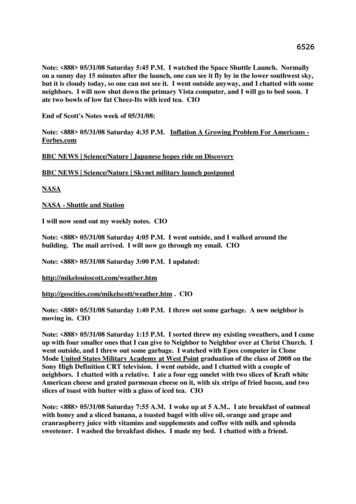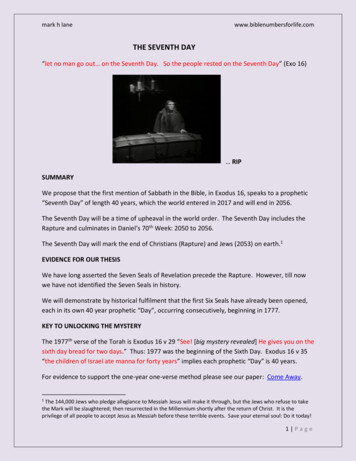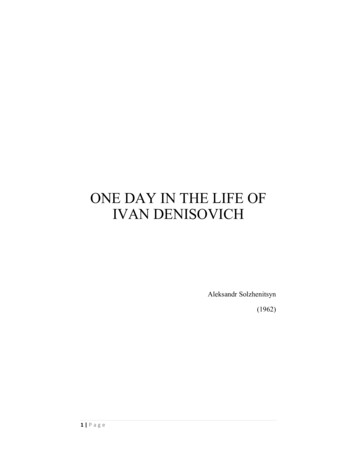
Transcription
ONE DAY IN THE LIFE OFIVAN DENISOVICHAleksandr Solzhenitsyn(1962)1 P ag e
One Day in the Life of Ivan DenisovichAleksandr Solzhenitsyn (1962)At five o'clock that morning reveille was sounded, asusual, by the blows of a hammer on a length of railhanging up near the staff quarters. The intermittentsounds barely penetrated the windowpanes on which thefrost lay two fingers thick, and they ended almost assoon as they'd begun. It was cold outside, and the campguard was reluctant to go on beating out the reveille forlong.The clanging ceased, but everything outside stilllooked like the middle of the night when IvanDenisovich Shukhov got up to go to the bucket. It waspitch dark except for the yellow light cast on thewindow by three lamps - two in the outer zone, oneinside the camp itself.And no one came to unbolt the barracks door; therewas no sound of the barrack orderlies pushing a pole.Into place to lift the barrel of excrement and carry itout.Shukhov never over slept reveille. He always got upat once, for the next ninety minutes, until theyassembled for work, belonged to him, not to the2 P ag e
authorities, and any old-timer could always earn a bit-by sewing a pair of mittens for someone out of oldsleeve lining; or bringing some rich loafer in the squadhis dry valenki1 -- right up to his bunk, so that hewouldn't have to stumble barefoot round the heap ofboots looking for his own pair; or going the rounds ofthe warehouses, offering to be of service, sweeping upthis or fetching that; or going to the mess hall to collectbowls from the tables and bring them stacked to thedishwashers--you're sure to be given something to eatthere, though there were plenty of others at that game,more than plenty--and, what's worse, if you found abowl with something left in it you could hardly resistlicking it out. But Shukhov had never forgotten thewords of his first squad leader, Kuziomin--a hard-bittenprisoner who had already been in for twelve years by1943--who told the newcomers, just in from the front,as they sat beside a fire in a desolate cutting in theforest:"Here, men, we live by the law of the taiga. But evenhere people manage to live. The ones that don't make itare those who lick other men's leftovers, those whocount on the doctors to pull them through, and thosewho squeal on their buddies."As for the preachers, he was wrong there. Thosepeople were sure to get through camp all right. Only,they were saving their own skin at the expense of otherpeople's blood.13 P ag eKnee-length felt boots for winter wear.
Shukhov always arose at reveille. But this day hedidn't. He had felt strange the evening before, feverish,with pains all over his body. He hadn't been able to getwarm all through the night. Even in his sleep he had feltat one moment that he was getting seriously ill, atanother that he was getting better. He had wishedmorning would never come.But the morning came as usual.Anyway, where would you get warm in a place likethis, with the windows iced over and the white cobwebsof frost all along the huge barracks where the wallsjoined the ceiling!He didn't get up. He lay there in his bunk on the toptier, his head buried in a blanket and a coat, both feetstuffed into one tucked-under sleeve of his waddedjacket. He couldn't see, but his ears told him everythinggoing on in the barrack room and especially in thecorner his squad occupied. He heard the heavy tread ofthe orderlies carrying one of the big barrels ofexcrement along the passage outside. A light job, thatwas considered, a job for the infirm, but just you try andcarry out the muck without spilling any. He heard someof the 75th slamming bunches of boots onto the floorfrom the drying shed. Now their own men were doing it(it was their own squad's turn, too, to dry valenki).Tiurin, the squad leader, and his deputy Pavlo put ontheir valenki without a word but he heard their bunkscreaking. Now Pavlo would be going off to the4 P ag e
breadstorage and Tiurin to the staff quarters to see theP.P.D2Ah, but not simply to report as usual to theauthorities for the daily assignment. Shukbovremembered that this morning his fate hung in thebalance: they wanted to shift the 104th from thebuilding shops to a new site, the "Socialist Way of Life"settlement. It lay In open country covered withsnowdrifts, and before anything else could be done therethey would have to dig holes and put up posts and attachbarbed wire to them. Wire themselves in, so that theywouldn't run away. Only then would they startbuilding.There wouldn't be a warm corner for a wholemonth. Not even a doghouse. And fires were out of thequestion. There was nothing to build them with. Letyour work warm you up, that was your only salvation.No wonder the squad leader looked so worried, thatwas his job--to elbow some other squad, some bunch ofsuckers, into the assignment instead of the 104th. Ofcourse with empty bands you got nowhere. He'd have totake a pound of salt pork to the senior official there, ifnot a couple of pounds.There's never any harm in trying, so why not have ago at the dispensary and get a few days off if you can?After all, he did feel as though every limb was out ofjoint.25 P ag eProduction Planning Department.
Then Shukhov wondered which of the camp-guardswas on duty that morning. It was "One-and-a-half"Ivan's turn, he recalled. Ivan was a thin, weedy, darkeyed sergeant. At first sight he looked like a real bastard,but when you got to know him he turned out to be themost good-natured of the guards on duty: he didn't putyou in the guardhouse, he didn't haul you off before theauthorities. So Shukhov decided he could lie in his bunka little longer, at least while Barracks 9 was at the messhall.The whole four-bunk frame began to shake and sway.Two of its occupants were getting up at the same time:Shukhov's top-tier neighbour, Alyosha the Baptist, andBuinovsky, the ex-naval captain down below.The orderlies, after removing both barrels ofexcrement, began to quarrel about which of themshould go for hot water. They quarrelled naggingly, likeold women."Hey you, cackling like a couple of hens!" bellowedthe electric welder in the 20th squad. "Get going." Heflung a boot at them.The boot thudded against a post. The squabblingstopped. In the next squad the deputy squad leadergrowled quietly:"Vasily Fyodorovich, they've cheated us again at thesupply depot, the dirty rats. They should have given usfour twenty-five-ounce loaves and I've only got three.Who's going to go short?"6 P ag e
He kept his voice down, but of course everyone inthe squad heard him and waited fearfully to learn whowould be losing a slice of bread that evening.Shukhov went on lying on his sawdust mattress, ashard as a board from long wear. If only it could be onething or the other--let him fall into a real fever or let hisaching joints ease up.Meanwhile Alyosha was murmuring his prayers andBuinovsky had returned from the latrines, announcing tono one in particular but with a sort of malicious glee:"Well, sailors, grit your teeth. It's twenty below, forsure."Shukhov decided to report sick.At that very moment his blanket and jacket wereimperiously jerked off him. He flung his coat away fromhis face and sat up. Looking up at him, his head levelwith the top bunk, was the lean figure of The Tartar.So the fellow was on duty out of turn and had stolenup."S 854," The Tartar read from the white strip thathad been stitched to the back of his black jacket. "Threedays' penalty with work."The moment they heard that peculiar choking voiceof his, everyone who wasn't up yet in the whole dimlylit barracks, where two hundred men slept in bugriddenbunks, stirred to life and began dressing in a hurry."What for, citizen3 chief?" asked Shukhov with morechagrin than he felt in his voice.37 P ag ePrisoners were not allowed to use the word comrade.
With work--that wasn't half so bad. They gave youhot food and you had no time to start thinking. Real jailwas when you were kept back from work."Failing to get up at reveille. Follow me to the campcommandanfs office," said The Tartar lazily.His crumpled, hairless face was imperturbable. Heturned, looking around for another victim, but noweverybody, in dim corners and. under the lights, inupper bunks and in lower, had thrust their legs intotheir black wadded trousers or, already dressed, hadwrapped their coats around themselves and hurried tothe door to get out of the way until The Tartar had left.Had Shukhov been punished for something hedeserved he wouldn't have felt so resentful. What hurthim was that he was always one of the first to be up. Buthe knew he couldn't plead with The Tartar. And,protesting merely for the sake of form, he hitched up histrousers (a bedraggled scrap of cloth had been sewn onthem, just above the left knee, with a faded blacknumber), slipped on his jacket (here the same digitsappeared twice--on the chest and on the back), fished hisvalenki from the heap on the floor, put his hat on (withhis number on a patch of cloth at the front), andfollowed The Tartar out of the barrack room.The whole 104th saw him go, but no one said aword--what was the use, and anyway what could theysay? The squad leader might have tried to do something,but he wasn't there. And Shukhov said nothing toanyone. He didn't want to irritate The Tartar. Anyway8 P ag e
he could rely on the others in his squad to keep hisbreakfast for him.The two men left the barracks. The cold madeShukhov gasp.Two powerful searchlights swept the camp from thefarthest watchtowers. The border lights, as well as thoseinside the camp, were on. There were so many of themthat they outshone the stars.With the snow creaking under their boots, theprisoners hurried away, each on his own business, someto the parcels office, some to hand in cereals to becooked in the "individual" kitchen. All kept their headsdown, buried in their buttoned-up coats, and all werechilled to the bone, not so much from the actual cold asfrom the prospect of having to spend the whole day init. But The Tartar in his old army coat with the greasyblue tabs walked at a steady pace, as though the coldmeant nothing to him.They walked past the high wooden fence around theguardhouse, the only brick building in the camp; pastthe barbed wire that protected the camp bakery fromthe prisoners; past the corner of the staff quarters wherethe length of frosted rail hung on thick strands of wire;past another pole with a thermometer hanging on it (in asheltered spot, so that the registered temperatureshouldn't drop too low). Shukhov looked hopefully outof the corner of an eye at the milk-white tube-- if it hadshown -41 they ought not to be sent out to work. Buttoday it was nowhere near -41 .9 P ag e
They walked into the staff quarters and The Tartarled him straight to the guardroom; and Shukhovrealized, as he bad guessed on the way there, that hewasn't being sent to the guardhouse at all--it was simplythat the guardroom floor needed scrubbing. The Tartartold him he was going to let him off, and ordered him toscrub the floor.Scrubbing the guardroom floor had been the job of aspecial prisoner who wasn't sent to work outside thecamp--a staff orderly. The fellow had long ago madehimself athome in the staff quarters; he had access to theoffices of the camp commandant, the man in charge ofdiscipline, and the security officer (the FatherConfessor, they called him). When working for them hesometimes beard things that even the guards didn'tknow, and after a time he got a big head and came toconsider scrubbing the floor for rank-and-file campguards a bit beneath him. Having sent for him once ortwice, the guards discovered what was in the wind andbegan to pick on other prisoners for the floor-scrubbing.In the guardroom the stove was throwing out a fierceheat. Two guards in grubby tunics were playingcheckers, and a third, who had not bothered to removehis sheepskin and valenki, lay snoring on a narrowbench. In one corner of the room stood an empty pailwith a rag inside.Shukhov was delighted. He thanked The Tartar forletting him off and said: "From now on I'll never get uplate again."10 P a g e
The rule in this place was a simple one: when you'dfinished you left. And now that he'd been given work todo, Shukhov's aches and pains seemed to have gone. Hepicked up the pail and, bare-handed--in his hurry he'dforgotten to take his mittens from under his pillow-went to the well.Several of the squad leaders who were on their wayto the P.P.D. had gathered near the pole with thethermometer, and one of the younger ones, a formerHero of the Soviet Union, shinnied up it and wiped offthe instrument.The others shouted advice from below:"See you don't breathe on it. It'll push up thetemperature.""Push it up? Not fucking likely. My breath won'thave any effect."Tiurin of the 104th--Shukhov's squad--was notamong them. Shukhov put down the pail, tucked hishands into his sleeves, and watched with interest.The man up the pole shouted hoarsely:"Twenty-seven and a half. Not a damn bit more."And, taking another look to be sure, slid down."Oh, it's cockeyed. It always lies," someone said."Do you think they'd ever hang one up that gave thetrue temperature?"The squad leaders scattered. Shukhov ran to thewell. The frost was trying to nip his ears under hisearflaps, which he had lowered but not tied.11 P a g e
The top of the well was so thickly coated with icethat he only just managed to slip the bucket into thehole. The rope hung stiff as a ramrod.With numb hands he carried the dripping bucketback to the guardroom and plunged his hands into thewater. It felt warm.The Tartar was no longer there. The guards--therewere four now--stood in a group. They'd given up theircheckers and their nap and were arguing about howmuch cereal they were going to get in January (food wasin short supply at the settlement, and although rationinghad long since come to an end, certain articles were soldto them, at a discount, which were not available to thecivilian inhabitants)."Shut that door, you scum. There's a draft," said oneof the guards.No sense in getting your boots wet in the morning.Even if Shukhov had dashed back to his barracks hewouldn't have found another pair to change into. Duringeight years' imprisonment he had known various systemsfor allocating footwear: there'd been times when he'dgone through the winter without valenki at all, orleather boots either, and had had to make shift with ropesandals or a sort of galoshes made of scraps of motortires--"Chetezes" they called them, after the Cheiabinsktractor works. Now the footwear situation seemedbetter; in October Shukhov had received (thanks toPavlo, whom he trailed to the warehouse) a pair ofordinary, hard-wearing leather boots, big enough for a12 P a g e
double thickness of rags inside. For a week he wentabout as though he'd been given a birthday present,kicking his new heels. Then in December the valenkiarrived, and, oh, wasn't life wonderful?But some devil in the bookkeeper's office hadwhispered in the commandant's ear that valenki shouldbe issued only to those who surrendered their boots. Itwas against the rules for a prisoner to possess two pairsof footwear at the same time. So Shukhov had to choose.Either he'd have to wear leather throughout the winter,or surrender the boots and wear valenki even in thethaw. He'd taken such good care of his new boots,softening the leather with grease! Ah, nothing had beenso hard to part with in all his eight years in camps as thatpair of boots! They were tossed into a common heap.Not a hope of finding your own pair in the spring.Now Shukhov knew what he had to do. Hedexterously pulled his feet out of the valenki, put thevalenki in a corner, stuffed his foot rags into them (hisspoon tinkled on the floor--though he'd made himselfready for the guardhouse in a hurry, he hadn't forgottenhis spoon), and, barefoot, sloshed the water right underthe guards' valenki."Hey there, you slob, take it easy," one of the guardsshouted, putting his feet on a chair."Rice?" another went on. "Rice is in a differentcategory. You can't compare cereal with rice.""How much water are you going to use, idiot? Whoon earth washes like that?"13 P a g e
"I'll never get it clean otherwise, citizen chief. It'sthick with mud.""Didn't you ever watch your wife scrub the floor,pig?"Shukhov drew himself up, the dripping rag in hishand. He smiled ingenuously, revealing the gaps in histeeth, the result of a touch of scurvy at Ust-Izhma in1943. And what a touch it was--his exhausted stomachwouldn't hold any kind of food, and his bowels couldmove nothing but a bloody fluid. But now only a lispremained from that old trouble."I was taken away from my wife in forty-one, citizenchief. I've forgotten what she was like.""That's the way the scum wash. . . . They don't knowhow to do a fucking thing and don't want to learn.They're not worth the bread we give them. We ought tofeed them on shit.""Anyway, what's the fucking sense in washing itevery day? Who can stand the damp? Look here, you,854. Just wipe it over lightly to make it moist and thenfuck off?"No, you can't compare cereal with rice."Shukhov knew how to manage anything.Work was like a stick. It had two ends. When youworked for the knowing you gave them quality; whenyou worked for a fool you simply gave him eyewash.Otherwise, everybody would have croaked long ago.They all knew that.14 P a g e
Shukhov wiped the floorboards with a damp rag sothat no dry patches remained, tossed the rag behind thestove without wringing it out, pulled on his valenki nearthe door, threw out the rest of the water onto the pathused by the camp authorities, and, taking short cuts,made a dash past the bathhouse and the dark, cold clubto the mess hall.He still had to fit in a visit to the dispensary. Heached all over. And there was that guard outside themess hall to be dodged--the camp commandant hadissued strict orders that prisoners on their own were tobe picked up and thrown into the guardhouse.That morning--a stroke of luck--there was no crowd,no lines, outside the mess. Walk in.The air was as thick as in a Turkish bath. An icy waveblew in through the door and met the steam rising fromthe stew. The squads sat at tables or crowded the aislesin between, waiting for places to be freed. Shouting toeach other through the crush, two or three men fromeach squad carried bowls of stew and oatmeal onwooden trays and tried to find room for them on thetables. Look at that damn stiff-necked fool. He doesn'thear, he's bumped a tray. Splash, splash! You've a handfree, bit him on the back of the neck. That's the way.Don't stand there blocking the aisle, looking forsomething to swipe!There at the table, before dipping his spoon in, ayoung man crossed himself. A West Ukrainian, thatmeant, and a new arrival, too.15 P a g e
As for the Russians, they'd forgotten which hand tocross themselves with.They sat in the cold mess hall, most of them eatingwith their hats on, eating slowly, picking out putridlittle fish from under leaves of boiled black cabbage andspitting the bones out on the table. When the bonesformed a heap and it was the turn of another squad,someone would sweep them off and they'd be troddeninto a mush on the floor. But it was considered badmaimers to spit the fishbones straight out on the floor.Two rows of trestles ran down the middle of the halland near one of them sat Fetiukov of the 104th. It washe who was keeping Shukhov's breakfast for him.Fetiukov had the last place in his squad, lower thanShukhov's. From the outside, everyone in the squadlooked the same--their numbered black coats wereidentical--but within the squad there were greatdistinctions. Everyone had his grade. Buinovsky, forinstance, was not the sort to sit keeping another zek's4bowl for him. And Shukhov wouldn't take on any oldjob either. There were others lower than him.Fetiukov caught sight of Shukhov and with a sighsurrendered his place."It's all cold. I was just going to eat your helping.Thought you were in the guardhouse."He didn't hang around--no hope for any leftovers toscrape out of Shukhov's bowl.416 P a g eAbbreviation of Russian for prisoner
Shukhov pulled his spoon out of his boot. His littlebaby. It had been with him his whole time in the North,he'd cast it with his own hands in sand out of aluminumwire, and it was embossed with the words "Ust-Izhma1944."Then he removed his hat from his clean-shaven head-however cold it might be, he could never bring himselfto eat with his hat on--and stirred the cold stew, taking aquick look to see what kind of helping they'd given him.An average one. They hadn't ladled it from the top ofthe kettle, but they hadn't ladled it from the bottomeither. Fetiukov was the sort who when he was lookingafter someone else's bowl took the potatoes from it.The only good thing about stew was that it was hot,but Shukhov's portion had grown quite cold. However,he ate it with his usual slow concentration. No need tohuriy, not even for a house on fire. Apart from sleep,the only time a prisoner lives for himself is ten minutesin the morning at breakfast, five minutes over dinner,and five at supper.The stew was the same every day. Its compositiondepended on the kind of vegetable provided that winter.Nothing but salted carrots last year, which meant thatfrom September to June the stew was plain carrot Thisyear it was black cabbage. The most nourishing time ofthe year was June; then all vegetables came to an endand were replaced by grits. The worst time was July-then they shredded nettles into the pot.17 P a g e
The little fish were more bone than flesh; 'the fleshhad been boiled off the bone and had disintegrated,leaving a few remnants on head and tail. Withoutneglecting a single fish scale or particle of flesh on thebrittle skeleton, Shukhov went on chomping his teethand sucking the bones, spitting the remains on the table.He ate everything--the gills, the tail, the eyes when theywere still in their sockets but not when they'd beenboiled out and floated in the bowl separately--big fisheyes. Not then. The others laughed at him for that.This morning Shukhov economized. Since he hadn'treturned to the barracks he hadn't drawn his rations, sohe ate his breakfast without bread. He'd eat the breadlater. Might be even better that way.After the vegetable stew there was magara , thatdamned "Chinese" oatmeal. It had grown cold too, andhad set into a solid lump. Shukhov broke it up intopieces. It wasn't only that the oatmeal was cold--it wastasteless even when hot, and left you no sense of havingfilled your belly. Just grass, except that it was yellow,and looked like cereal. They'd got the idea of serving itinstead of cereals from the Chinese, it was said. Whenboiled, a bowlful of it weighed nearly a pound. Notmuch of an oatmeal but that was what it passed for.Licking his spoon and tucking it back into his boot,Shukhov put on his hat and went to the dispensary.The sky was still quite dark. The camp lights droveaway the stars. The broad beams of the two searchlightswere still sweeping the zone. When this camp, this18 P a g e
"special" (forced-labor) camp, had been organized, thesecurity forces had a lot of flares left over from the war,and whenever there was a power failure they shot upflares over the zone--white, green, and red--just likereal war. Later they stopped using them. To savemoney, maybe.It seemed just as dark as at reveille but theexperienced eye could easily distinguish, by varioussmall signs, that soon the order to go to work would begiven. Khromoi's assistant (Khromoi, the mess orderly,had an assistant whom he fed) went off to summonBarracks 6 to breakfast This was the building occupiedby the infirm, who did not leave the zone. An old,bearded artist shuffled off to the C.E.D5, for the brushand paint he needed to touch up the numbers on theprisoners' uniforms. The Tartar was there again, cuttingacross the parade ground with long, rapid strides in thedirection of the staff quarters. In general there werefewer people about, which meant that everyone hadgone off to some corner or other to get warm duringthose last precious minutes.Shukhov was smart enough to hide from The Tartararound a corner of the barracks--the guard would stickto him if he caught him again. Anyway, you shouldnever be conspicuous. The main thing was never to beseen by a campguard on your own, only in a group.Who knows whether the guy wasn't looking forsomeone to saddle with a job, or wouldn't jump on a519 P a g eCulture and Education Department.
man just for spite? Hadn't they been around the barracksand read them that new regulation? You bad to take ofiyour hat to a guard five paces before passing him, andreplace it two paces after. There were guards whoslopped past as if blind, not caring a damn, but forothers the new rule was a godsend. How many prisonershad been thrown in the guardhouse because of that hatbusiness? Oh no, better to stand around the corner.The Tartar passed by, and now Shukhov finallydecided to go to the dispensary. But suddenly heremembered that the tall Lett in Barracks 7 had told himto come and buy a couple of glasses of home-growntobacco that morning before they went out to work,something Shukhov bad clean forgotten in all theexcitement. The Lett had received a parcel the previousevening, and who knew but that by tomorrow none ofthe tobacco would be left, and then he'd have to wait amonth for another parcel. The Lett's tobacco was goodstuff, strong and fragrant, greyish-brown.Shukhov stamped his feet in vexation. Should he turnback and go to the Lett? But it was such a short distanceto the dispensary and he jogged on. The snow creakedaudibly underfoot as he approached the door.Inside, the corridor was, as usual, so clean that hefelt quite scared to step on the floor. And the 'wallswere painted with white enamel. And all the furniturewas white.The surgery doors were all shut. The doctors muststill be in bed. The man on duty was a medical assistant-20 P a g e
-a young man called Kolya Vdovushkin. He was seatedat a clean little table, wearing a small white cap and asnow-white smock. Writing something.There was no one else in sight.Shukhov took off his hat as if in the presence of oneof the authorities and, letting his eyes shift, in the campmanner, where they had no business to shift, he noticedthat Kolya was writing in even, neatly spaced lines andthat each line, starting a little way from the edge of thepage, began with a capital letter. He realized at once, ofcourse, that Kolya was not doing official work butsomething on the side. But that was none of his business."Well, Nikolai Semyonich, it's like this. . . . I'mfeeling sort of . . . rotten . . . ," said Shukhovshamefacedly, as if coveting something that didn'tbelong to him.Kolya Vdovushkin raised his big placid eyes from hiswork. His number was covered up by his smock;"Why've you come so late? Why didn't you reportsick last night? You know very well there's no sick call inthe morning. The sick list has already been sent to theplanning department."Shukhov knew all this. He knew too that it was evenharder to get on the sick list in the evening."But after all, Kolya . . . You see, when I should havecome . . . last night . . . it didn't ache.""And now it does? And what is it?""Well, if you stop to think of it, nothing aches, but Ifeel ill all over."21 P a g e
Shukhov was not one of those who hung around thedispensary. Vdovushkin knew this. But in the morninghe had the right to exempt from work two men only,and he'd already exempted them--their names werewritten down under the glass--it was greenish--on hisdesk, and he'd drawn a line across the page."Well, you ought to have considered that earlier.What are you thinking about? Reporting sick just beforeroll call. Come on, take this."He pulled a thermometer out of one of the jarswhere they stood in holes cut in pieces of gauze, wipedit dry, and handed it to Shukhov, who put it in hisarmpit.Shukhov sat on a bench near the wall, right at thevery end, so that be nearly tipped it up. He sat in thatuncomfortable way, involuntarily emphasizing that hewas unfamiliar with the place and that he'd come thereon some minor matter.Vdovushkin went on writing.The dispensary lay in the most remote and desertedcorner of the zone, where no sounds of. any sortreached it. No clocks or watches ticked there--prisonerswere not allowed to carry watches; the authorities knewthe time for them. Even mice didn't scratch there;they'd all been dealt with by the hospital cat, placedthere for the purpose.For Shukhov it was a strange experience to sit in thatspick-and-span room, in such quietness, to sit under thebright lamps for five long minutes doing nothing. He22 P a g e
cast his eyes around the wails and found them empty.He looked at his jacket--the number on the chest wasalmost rubbed off. That might be noticed. He ought tohave it touched up. He ran his free hand over his chinand felt the stubble. His beard had grown fast since hislast bath, over ten days back. But that didn't worry him.Next bath day was about three days off and he'd have ashave then. What was the sense in lining up at thebarber's? Who did he have to doll himself up for?Then as he eyed Vdovuahkin's snow-white cap heremembered the hospital on the banks of the RiverLovat where he'd been taken with a smashed jaw, andthen--what a dope he was!--volunteered for the frontagain, though he could have lain there in bed for fivedays.And now here he was dreaming of being ill for twoor three weeks, not dangerously ill, of course, not sobad that they'd have to operate, yet bad enough to go tothe hospital and lie in bed for three weeks withoutstirring; and let them feed him on nothing but that clearsoup of theirs, he wouldn't mind.But, he recalled, now they didn't let you lie in bedeven in the camp infirmary. A new doctor had arrivedwith one of the latest replacements--Step
Jan 05, 2015 · "Here, men, we live by the law of the taiga. But even here people manage to live. The ones that don't make it are those who lick other men's leftovers, those who count on the doctors to pull them through, and those who squeal on their buddies." As for the preachers, he was wrong the

